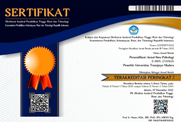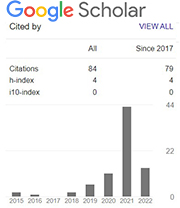Hope, Self Regulated Learning, dengan Problem Focus Coping Mahasiswa Tingkat Akhir
Abstract
Penulisan Skripsi is a subject for student to complete their studies at Bachelor’s level. During the thesis work, students should actively search for theories and literature in various valid sources, read and understanding literature, and also carry out discussions and guidance with the lecturer as their supervisors, but the facts found are that students have behaviors that leads to problem focused coping. The aim of this research is to determine the relationship between hope, self regulated learning, and problem focused coping in final year students. The research method is a quantitative method and uses a saturated sampling as a technique for selecting research subjects. Research data is analized using product moment correlation and multiple correlation techniques to analized minor and major hypotheses. The research result showed that an R value of 0.648 was obtained. Sig value F.Change is 0.000, which shows that 0.000 smaller than 0.05, which means self regulated learning and hope noth have a relationship with problem focused coping. The significance test was to determine the calculated F, obtained as F Change and calculated F smaller than Ftable which was obtained 27.193 more than 3.119. This shows that the major hypothesis is accepted and there is a positive relationship between self regulated learning, hope, and problem focused coping.
Keywords
Full Text:
PDF (Bahasa Indonesia)References
Azwar, S. (2014). Penyusunan skala psikologi. Pustaka Pelajar.
Chen, S. C., & Zomeren, M. Van. (2018). Yes we can? Group efficacy beliefs predict collective action, but only when hope is high. Journal of Experimental Social Psychology, 77, 50–59. https://doi.org/10.1016/j.jesp.2018.03.016
Damayanti, Y. M. (2020). Hubungan antara strategi koping stres dengan subjective well-being pada mahasiswa [Skripsi]. Unika Soegijapranata. https://repository.unika.ac.id/id/eprint/25010
Filho, M. (2001). A review on theories of self regulated learning: Vol. 3 (50). Bull Grad School Education Hiroshima University. https://hiroshima.repo.nii.ac.jp/record/2031785/files/KJ00004253985.pdf
Folkman, S., & Lazarus, R. S. (1980). An analysis of coping in a middle-aged community sample. Journal of Health and Social Behavior, 21(3), 219. https://doi.org/10.2307/2136617
Ilmiah, I., & Utomo, T. (2020). Hubungan self confidence dengan adversity quotient pada mahasiswa pasca drop out di universitas trunojoyo madura. Personifikasi: Jurnal Ilmu Psikologi, 11(1), 34–47. https://doi.org/10.21107/personifikasi.v11i1.7289
Kurniawan, T. (2020). Hubungan antara self regulated learning dan problem focused coping pada mahasiswa di surabaya yang menempuh program skripsi dalam situasi pandemi covid-19 [Disertasi]. Universitas 17 Agustus 1945.
Lazarus, R. S., & Folkman, S. (1986). Stress, appraisal, and coping. Springer.
Othman, R., Kamal, N. M., Alias, N. E., Ismail, S., & Sahiq, A. N. Md. (2018). Positive psychological traits and career adaptability among millennials. International Journal of Academic Research in Business and Social Sciences, 8(9). https://doi.org/10.6007/IJARBSS/v8-i9/4706
Rindahayu, T. (2022). Hubungan antara hope dan social skill dengan problem focused coping pada mahasiswa yang sedang menyelesaikan skripsi [Skripsi]. UIN RADEN INTAN LAMPUNG.
Santrock, J. W. (2018). Life span development (17th ed.). McGraw-Hill.
Seligman, M. E. P. (2008). Menginstal optimisme. PT. Karya Kita.
Smet, B. (1994). Psikologi kesehatan. PT. Gramedia Widiasarna Indonesia.
Snyder, C. R. (2000). Hypothesis. In Handbook of Hope (pp. 3–21). Elsevier. https://doi.org/10.1016/B978-012654050-5/50003-8
Snyder, C. R. (2005). Teaching: The Lessons of Hope. Journal of Social and Clinical Psychology, 24(1), 72–84. https://doi.org/10.1521/jscp.24.1.72.59169
Snyder, C. R., Sympson, S. C., Ybasco, F. C., Borders, T. F., Babyak, M. A., & Higgins, R. L. (1996). Development and validation of the state hope scale. Journal of Personality and Social Psychology, 70(2), 321–335. https://doi.org/10.1037/0022-3514.70.2.321
Wakhyudin, H., & Putri, A. D. S. (2020). Analisis kecemasan mahasiswa dalam menyelesaikan skripsi. WASIS : Jurnal Ilmiah Pendidikan, 1(1), 14–18. https://doi.org/10.24176/wasis.v1i1.4707
Zapata, L., De la Fuente, J., Martínez Vicente, J. M., González Torres, M. C., & Artuch, R. (2016). Relations between the personal self-regulation and learning approach, coping strategies, and self-regulation learning, in university students (process). International Journal of Developmental and Educational Psychology. Revista INFAD de Psicología., 4(1), 175. https://doi.org/10.17060/ijodaep.2014.n1.v4.601
Zimmerman, B. J. (1989). A social cognitive view of self-regulated academic learning. Journal of Educational Psychology, 81(3), 329–339. https://doi.org/10.1037/0022-0663.81.3.329
Zomeren, M. van, Pauls, I. L., & Chen, S. C. (2019). Is hope good for motivating collective action in the context of climate change? Differentiating hope’s emotion- and problem-focused coping functions. Global Environmental Change, 58, 101915. https://doi.org/10.1016/j.gloenvcha.2019.04.003
DOI: https://doi.org/10.21107/personifikasi.v15i2.27862
Refbacks
- There are currently no refbacks.
Copyright (c) 2024 Puri Aquarisnawati

This work is licensed under a Creative Commons Attribution 4.0 International License.


Personifikasi by Universitas Trunojoyo Madura is licensed under a Creative Commons Attribution 4.0 International License.










